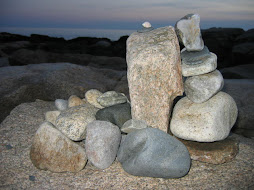I've already established my antipathy towards beret-wearing, finger snappin', liner note quotin' Thelonius Monksters. In short, what I call jazz douches.
Don't get me wrong. I own Miles Davis' 'Bitches Brew'. I've zoned out to Charlie Parker. I get it. But there is this sense among rabid jazz fans that somehow it is not as popular as it deserves to be, as if it should be the preferred genre. This reminds me of right wing nutjobs raging against all the people who speak Spanish as a first language. And who are Americans.
Jazz is ethereal. It is ephemeral. It is esoteric. It is a whole slew of words beginning with 'E' that don't mean jack shit to most people. Sorry, but three chords and a point of view work a hell of a lot better than minor diminished sevenths and ambiguity. They just do.
Somehow Dave Eggers has written a memoir that is more fun than a novel, a novel that is more fun than most memoirs and a big fat rock and roll concept album that incorporates everything jazz douches love about jazz. He shoots off on crazy tangents like jazz players. He throws in little homages to outside influences without even calling too much attention to it like jazz players.
Unlike jazz fans, however, he has a sense of humor about the whole thing.
I mention jazz in conjunction with this book only because I did 'Side Man' at Stamford Theater Works in Stamford, Connecticut the year it was released. As I auditioned for it I knew I would get it because it is all about jazz players in the 1950's. Of course a man who has coined the term 'jazz douche' would be condemned to being in a play where the free-form improvisation of jazz is used as a metaphor to mirror a chaotic upbringing.
When I got the part I wasn't surprised.
Stamford is about an hour outside of New York City by commuter train. For roughly six weeks I hopped on a train and rode out to the little barn tucked in behind a private school. The play was much more than a paean to jazz. I quickly discovered why it had won the Tony. It wasn't a bunch of grizzled beret wearers talking about how the Bird could really blow.
It was a devastating picture of a family destroyed by alcoholism.
If you came up with a simple outline for Eggers' book, you'd never say it would be a laugh a minute. Young man must care for younger brother after both parents die of cancer within six months of each other. You'd think it would be sappy, full of woe-is-me and isn't-this-hard. In short you'd think it would fall into the cliche of your expectations.
But from the opening page he lets you know that you would be sadly mistaken if that was what you came for. He interrupts the publisher's page with tiny jokes. He puts drawings of toast in the book. He will do just about anything to get a laugh. This attitude doesn't diminish the impact of the details of his life, it amplifies them a thousandfold. The desire to entertain becomes a beautiful reaction against such pain.
The character I played in 'Side Man' is named Clifford Glimmer. His father is a journeyman jazz player, a side man. Chaos rules the house. My mother is mentally ill and abuses alcohol. My father only cares about music. It doesn't define his personality, it IS his personality.
We follow my character from youth to young adulthood and the play culminates in a terrible domestic scene. I finally step in and force my parents to split up. I then move to California to pursue my own dreams.
The play is hilarious, by the way.
I loved riding out to Stamford. I loved doing that play. It even helped me turn the corner and love jazz. Still hate jazz douches but I get it. I get it.
Subscribe to:
Post Comments (Atom)


No comments:
Post a Comment